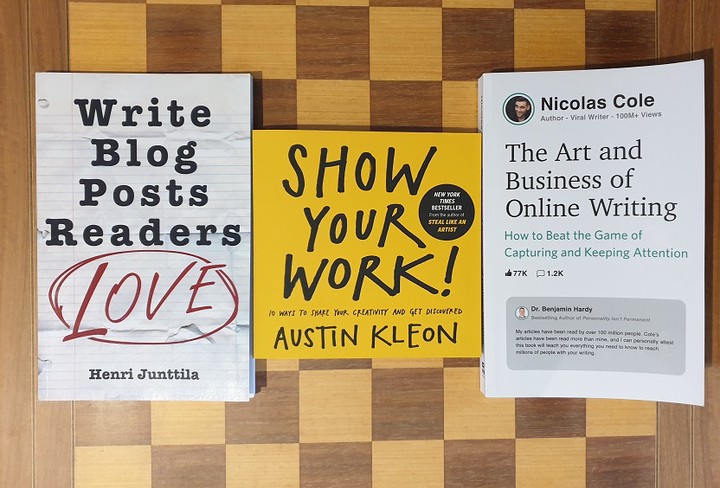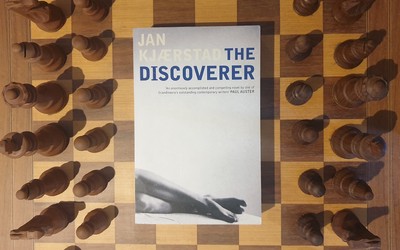
#26: Why write about chess?
The benefits of writing that might encourage YOU to get startedAfter 6 months of publishing posts about chess (and halfway to my original ‘goal’ for 2023, 50 posts), I feel it’s a good time to touch on the act of writing itself.
Writing about chess, while not easy, is a rewarding and fulfilling activity. Though I’m still early on in my journey, here are a few reasons I would recommend it to others:
1. Self-expression
Writing about chess gives you a platform for expressing your unique thoughts, insights and perspectives on the game.
- Putting yourself out there is scary. You have doubts about whether your writing is any good, and the question, “why am I even doing this?” crosses your mind all the time. However, if you persevere and keep hitting that Publish button, you can grow in confidence as you overcome the waves of doubt and fear each time—and you can find out more about yourself and grow in the process. The fear and doubt still remain, you just get a bit better at managing them over time.
- Tapping into your creative side stimulates your brain, is cathartic and can relieve stress. You might have spent years of your life on chess, but creating content on it is a whole new
ballboard game. Working on improving your writing enriches you and allows you to connect deeper with yourself.

2. Connecting with and giving value to others
Writing about chess allows you to connect with readers and other writers who are also passionate about chess. Having others appreciate something you’ve created that means a lot to you feels great, and it’s rewarding hearing you’ve been able to help someone with their chess—even someone on the other side of the world!
- Since starting in February, I’ve had quite a few players go out of their way to approach me at tournaments, telling me they enjoy my writing. I’ve also received kind words online through comments and emails. To be honest, publishing consistently is hard work, but I’ve received a lot of support and every time I hear my writing has been helpful or interesting, it feels like it’s all been worth it.
- By writing about chess, you can contribute to the learning and growth of fellow chess enthusiasts. Your insights might help players improve their skills, gain a deeper understanding of the game or even invite newcomers to the game. With the rise in popularity of chess over the last few years, now is a better time than ever to create content, and I believe everyone has a market they can write for.

3. Meaningful action
When I was younger, how I’d perform at chess tournaments meant the world to me. Although I’m still working on my chess and striving to improve, I have other things that also mean a lot to me now, including writing.
By creating things borne out of your unique experiences and insights, you can help and inspire others online and also OTR (over-the-reality) . Transcending space and time, you can impact the world through the things you publish and share.
Chess, which has captivated millions of people around the world for centuries, is evolving in the 21st century with the advent of computers and the Internet. There are many ways you can be a part of the chess community—playing, coaching, writing, creating courses, creating videos, streaming, organising and helping out at events, running chess websites. For some of you, writing might be an activity that suits your personality or interests.
Chess and writing are both timeless endeavours that connect and inspire people—and I believe the combination of the two, writing about chess, has a strong future.
Writing about chess: where to start
It’s easier than ever to write about chess online—you can start blogging on Lichess or Chess.com. You can also try other platforms like Substack, Medium or X (Twitter).
Since deciding to start writing online, I wanted to learn about it and improve so since last year I’ve read various books on writing, writing online and marketing. Here are three very accessible books that are good starting points for inspiration and guidance:
The truth is you already know what it's like. You already know the difference between the size and speed of everything that flashes through you and the tiny inadequate bit of it all you can ever let anyone know. As though inside you is this enormous room full of what seems like everything in the whole universe at one time or another and yet the only parts that get out have to somehow squeeze out through one of those tiny keyholes you see under the knob in older doors. As if we are all trying to see each other through these tiny keyholes.
But it does have a knob, the door can open. But not in the way you think...The truth is you've already heard this. That this is what it's like. That it's what makes room for the universes inside you, all the endless inbent fractals of connection and symphonies of different voices, the infinities you can never show another soul. And you think it makes you a fraud, the tiny fraction anyone else ever sees? Of course you're a fraud, of course what people see is never you. And of course you know this, and of course you try to manage what part they see if you know it's only a part. Who wouldn't?
—David Foster Wallace, Good Old Neon
If you'd like to receive posts like this in your inbox, you can subscribe to my free newsletter at https://juntaikeda.substack.com/.



